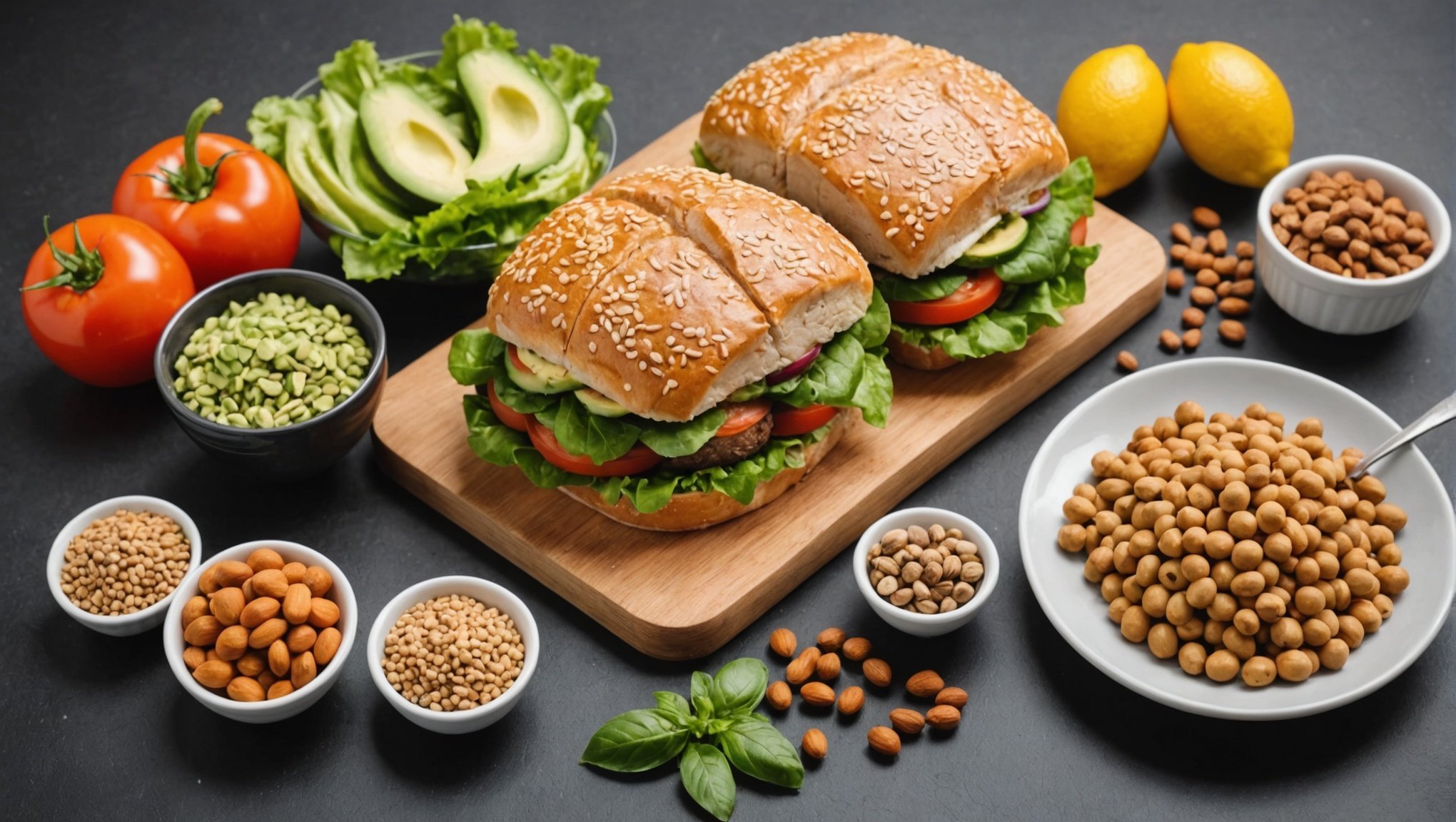Vegan athletes face unique challenges when it comes to achieving optimal protein intake. Many rely on supplements, but it's possible to meet your protein needs purely through whole foods. This guide reveals effective plant-based strategies, emphasizing diverse sources and meal combinations that maximize protein while supporting muscle recovery and performance. Learn how to craft a balanced diet that fuels your workouts, enhances strength, and embraces your vegan lifestyle without the need for excess supplementation.
Understanding Protein Needs for Vegan Athletes
For vegan athletes, understanding their macronutrient needs is crucial to optimize performance. Protein plays a pivotal role in muscle repair and growth, making it an essential component of an athlete's diet.
Also to discover : Top Low-Impact Workouts for Athletes: Effective Recovery After Knee Surgery
Importance of Protein in Athletic Performance
Protein is fundamental for athletes as it supports muscle recovery and development. It also aids in maintaining energy levels during intense activities. For vegan athletes, ensuring adequate protein intake can be more challenging due to the exclusion of animal-based protein sources.
Daily Protein Requirements for Athletes
The daily protein requirements for athletes generally range from 1.2 to 2.0 grams per kilogram of body weight. This range caters to varying levels of training intensity and goals. Vegan athletes must be particularly mindful of their protein intake to meet these requirements, as plant-based proteins often have lower bioavailability compared to animal proteins.
Topic to read : Boosting Soccer Speed: The Impact of Plyometric Exercises on Player Performance
Differences in Protein Needs Between Vegan and Non-Vegan Athletes
While the protein needs of vegan and non-vegan athletes are similar, the sources differ. Vegan athletes should focus on consuming a variety of plant-based proteins to ensure they receive all essential amino acids. Combining foods like legumes, grains, nuts, and seeds can help meet these needs effectively, ensuring that vegan athletes maintain optimal performance levels.
Top Plant-Based Protein Sources
For vegan athletes, plant-based protein sources are essential to meet daily protein requirements and maintain optimal performance. A diverse intake of whole foods can ensure a balanced vegan nutrition plan.
Legumes and Pulses
Legumes and pulses, such as lentils and chickpeas, are excellent sources of protein. These foods are not only rich in protein but also provide essential nutrients like iron and fiber. Incorporating a variety of legumes into meals can help vegan athletes meet their protein needs effectively.
Whole Grains
Whole grains, including quinoa and brown rice, offer a substantial amount of protein and are versatile in vegan nutrition. Quinoa, in particular, is a complete protein, meaning it contains all essential amino acids. Whole grains can be easily integrated into meals, providing both energy and protein.
Nuts and Seeds
Nuts and seeds, such as chia seeds and hemp seeds, are compact sources of protein and healthy fats. They can be added to smoothies, salads, or snacks, enhancing the nutritional profile of a vegan diet. Hemp seeds are particularly noteworthy for their high protein content and omega-3 fatty acids, supporting overall health and athletic performance.
By focusing on these plant-based protein sources, vegan athletes can ensure they receive the necessary nutrients to support their training and recovery.
Creating Balanced Meals for Optimal Protein Intake
Crafting meals that meet the protein needs of vegan athletes involves strategic meal planning and focusing on nutrient density. This ensures that athletes not only meet their protein requirements but also maintain overall health and performance.
Combining Protein Sources
To maximize protein intake, athletes should focus on protein combinations. By pairing foods like legumes with grains, such as lentils and brown rice, athletes can create complete proteins. This method ensures that all essential amino acids are consumed, which is crucial for muscle repair and growth. Including a variety of protein sources like nuts, seeds, and whole grains will further enhance nutrient intake.
Meal Prep Tips
Effective meal prep is essential for maintaining a balanced diet. Preparing meals in advance helps ensure that a variety of protein sources are included throughout the week. Athletes should aim to incorporate different textures and flavors to keep meals interesting and satisfying. Storing meals in portioned containers can also save time and help manage food intake.
Examples of Balanced Vegan Meals
- Quinoa salad with chickpeas, avocado, and spinach
- Stir-fried tofu with broccoli, bell peppers, and brown rice
- Chia seed pudding with almond milk, berries, and hemp seeds
These meal ideas provide diverse protein sources and are easy to prepare, supporting the dietary needs of vegan athletes.
Overcoming Challenges in Vegan Protein Consumption
Navigating the nutritional challenges of a vegan diet, particularly regarding protein, can be daunting for athletes. A common concern is the quality of plant-based proteins. While some believe that vegan proteins lack essential amino acids, this can be mitigated by consuming a variety of sources. By combining foods like legumes and grains, athletes can ensure they receive a complete amino acid profile, enhancing protein quality.
Protein absorption is another challenge for vegan athletes. To improve absorption, it's beneficial to include vitamin C-rich foods, such as citrus fruits or bell peppers, alongside iron-rich plant proteins. This combination enhances iron absorption, a crucial mineral for athletic performance. Additionally, soaking or sprouting legumes and grains can increase nutrient availability, making them easier to digest.
Several myths surround vegan protein sources, with one being that they are insufficient for muscle growth. However, studies show that with careful planning, vegan athletes can achieve their protein needs effectively. Plant-based proteins like tofu, tempeh, and quinoa are not only rich in protein but also provide other essential nutrients. By addressing these misconceptions and focusing on diverse protein sources, vegan athletes can overcome these challenges and thrive in their training.
Monitoring Protein Intake Effectively
For vegan athletes, protein tracking is essential to ensure nutritional needs are met. Utilizing nutrition apps can simplify this process, offering a convenient way to monitor daily intake. These apps often provide detailed breakdowns of macronutrients, helping athletes identify any deficiencies or excesses in their diet. By inputting meals and snacks, athletes can keep a close eye on their protein consumption, ensuring they stay within their target range.
Regular dietary assessment is equally important. This involves evaluating one's diet to ensure it aligns with personal health and performance goals. By conducting periodic assessments, athletes can make informed decisions about adjustments needed to optimize their nutrition. This might include increasing protein intake during periods of intense training or reducing it during rest phases.
Adjusting protein intake based on performance goals is crucial. For instance, if an athlete aims to build muscle, they may need to increase their protein consumption. Conversely, if the goal is maintenance, a balanced approach might suffice. Nutrition apps can assist in tracking these changes, allowing athletes to tailor their diet effectively. By staying vigilant with protein tracking and dietary assessments, vegan athletes can enhance their performance and overall well-being.
Recipes for High-Protein Vegan Meals
Creating protein-rich meals is essential for vegan athletes aiming to meet their nutritional requirements. Here are some delicious and nutritious options for every meal of the day.
Breakfast Ideas
Kickstart your day with a high-protein breakfast. A tofu scramble, seasoned with turmeric and nutritional yeast, offers a savoury start packed with protein. Add spinach and tomatoes for extra nutrients. Alternatively, consider a chia seed pudding mixed with almond milk and topped with berries for a sweet, protein-packed option.
Lunch and Dinner Options
For lunch, a chickpea salad with quinoa, avocado, and cherry tomatoes provides a balanced meal rich in protein and healthy fats. Dress it with lemon and olive oil for added flavour. For dinner, a lentil and vegetable curry served with brown rice offers a hearty, protein-rich meal. Incorporating a variety of vegetables ensures a nutrient-dense dish.
Snacks and Smoothies
Keep your energy levels up with protein-packed snacks. Roasted chickpeas or a handful of almonds make for convenient, protein-rich snacks. For a refreshing option, blend a smoothie with spinach, banana, hemp seeds, and almond milk. This combination not only satisfies hunger but also boosts protein intake, supporting your athletic performance.
Success Stories from Vegan Athletes
Exploring the success stories of vegan athletes provides insight into how a plant-based diet can support athletic performance. Many athletes have shared their experiences, detailing how they meet their protein needs and the positive impact on their performance.
Athlete Testimonials and Strategies
Numerous athlete testimonials highlight the effectiveness of a vegan diet in achieving peak performance. For instance, some athletes focus on a strategic combination of plant-based proteins to ensure they meet their nutritional requirements. They often emphasize the importance of variety, including legumes, grains, nuts, and seeds in their diet. This diversity not only satisfies protein needs but also enhances overall nutrient intake.
Impact on Performance
The performance of vegan athletes often improves with a well-planned diet. Many report increased energy levels, faster recovery times, and improved endurance. These benefits are attributed to the high nutrient density and anti-inflammatory properties of plant-based foods. By carefully planning their meals, athletes can optimize their diet to support their training and competition goals.
These vegan success stories demonstrate that with careful planning and a focus on diverse protein sources, athletes can thrive on a vegan diet. Their experiences serve as inspiration for others considering this lifestyle, showcasing the potential for enhanced performance and well-being.
Nutritional Advice for Vegan Athletes
Navigating a vegan diet as an athlete requires a comprehensive approach to nutritional guidance. While protein is a focal point, the importance of micronutrients cannot be overlooked. These essential nutrients, including vitamins and minerals, play a crucial role in maintaining athlete health and optimizing performance. For instance, vitamin B12, iron, and calcium are often lacking in plant-based diets and require careful attention.
To ensure overall health and performance, vegan athletes should adopt strategies that encompass more than just protein intake. Incorporating a wide variety of fruits, vegetables, and fortified foods can help meet micronutrient needs. Additionally, omega-3 fatty acids, often found in fish, can be sourced from flaxseeds or algae-based supplements, supporting cardiovascular health and reducing inflammation.
Consulting with nutrition experts can provide personalized wellness tips tailored to individual needs. These professionals can offer insights into balancing macronutrients and micronutrients, ensuring that athletes receive comprehensive nutritional support. Regular consultations can help identify any deficiencies and adjust dietary plans accordingly, promoting sustainable health and performance.
By focusing on a holistic approach to nutrition, vegan athletes can maintain their health and achieve their performance goals, ensuring they thrive both on and off the field.
Conclusion: Embracing a Vegan Lifestyle for Athletic Success
Adopting a vegan lifestyle offers numerous long-term benefits for athletes, enhancing both athletic performance and overall health. A plant-based diet is rich in antioxidants and anti-inflammatory compounds, contributing to quicker recovery times and sustained energy levels. By focusing on sustainable nutrition, athletes can support their training goals while promoting environmental and ethical values.
Exploring plant-based nutrition can be an empowering journey. It allows athletes to discover diverse food options and innovative meal plans that meet their nutritional needs. Embracing this lifestyle encourages a deeper understanding of food sources and their impact on performance. Athletes interested in transitioning to a vegan diet should seek guidance from nutrition experts to tailor their intake effectively.
For those embarking on this path, numerous resources are available to support the transition. Online communities, cookbooks, and nutrition workshops can provide valuable insights and inspiration. These resources help athletes learn how to balance their diet, ensuring they consume the right mix of macronutrients and micronutrients.
By embracing a vegan lifestyle, athletes can achieve their performance goals while contributing to a healthier planet. The journey is not only about enhancing athletic success but also about fostering a more compassionate and sustainable way of living.













